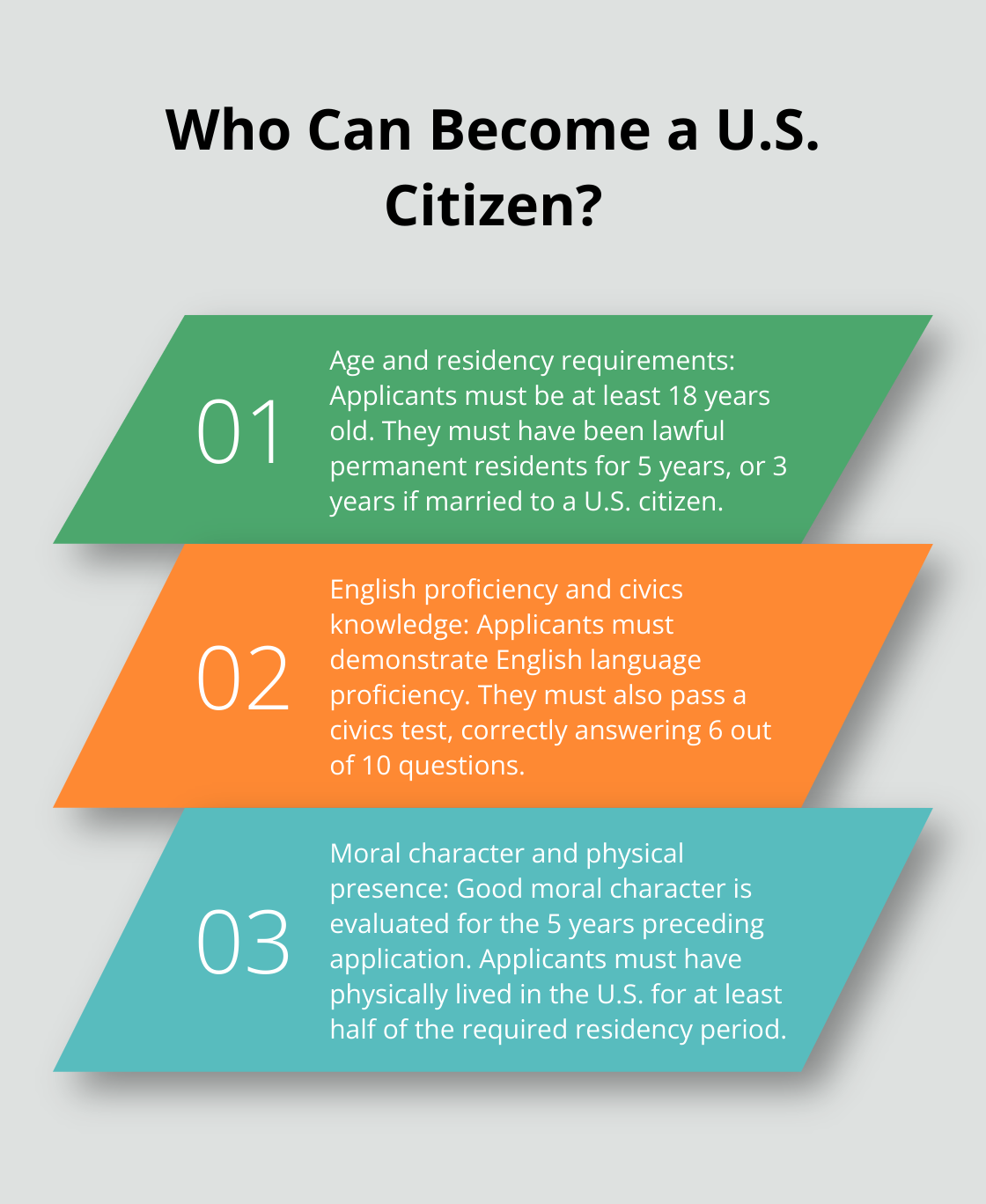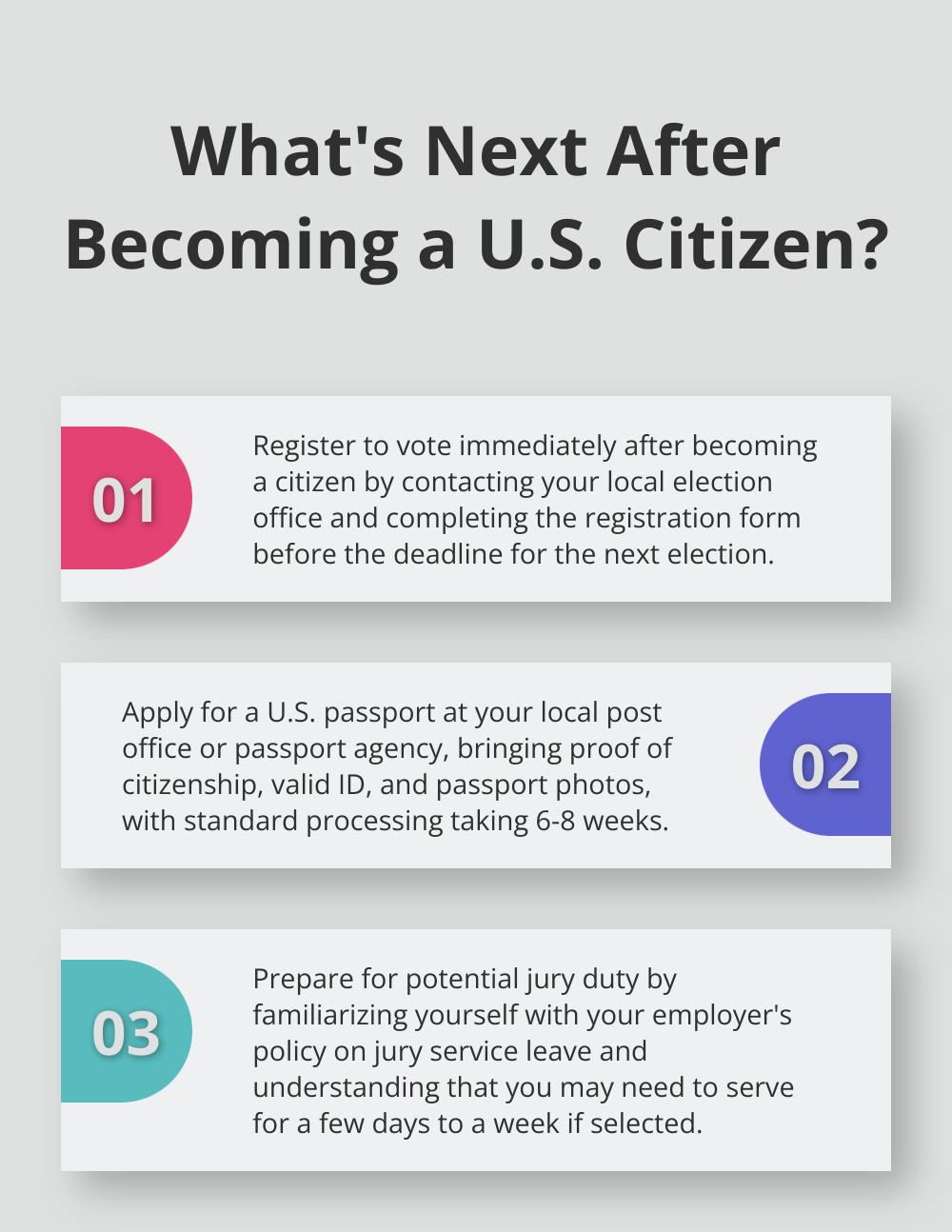
Comprehensive Citizenship Guide
Becoming a U.S. citizen is a significant milestone in an immigrant’s life. This comprehensive citizenship guide will walk you through the essential steps of the naturalization process.
At Law Offices of Jeffrey A. Thompson, we understand the complexities involved and are here to help you navigate this journey. From eligibility requirements to the rights and responsibilities of citizenship, we’ll cover everything you need to know to make your American dream a reality.
Who Can Become a U.S. Citizen?
Age and Residency: The Foundation of Eligibility
To apply for U.S. citizenship, you must be at least 18 years old and have been a lawful permanent resident (green card holder) for at least five years. If you’re married to a U.S. citizen, this residency requirement reduces to three years. You must have physically lived in the U.S. for at least half of the required residency period.
Demonstrating Good Moral Character
The U.S. Citizenship and Immigration Services (USCIS) evaluates an applicant’s moral character during the naturalization process. This assessment covers the five years preceding your application (or three years if married to a U.S. citizen). Factors that can negatively impact your moral character evaluation include criminal convictions, failure to pay taxes, and lying to immigration officials. It’s essential to be thorough and honest throughout the process to avoid complications.
English Proficiency: A Key Requirement
Applicants must demonstrate English language proficiency, which is determined by the applicant’s ability to read, write, speak and understand English. The naturalization interview includes an English test, where you’ll read a sentence aloud and write a sentence dictated by the USCIS officer. While this might seem challenging, many community organizations offer free English classes tailored for citizenship applicants. These resources can greatly help you prepare for your interview.
Understanding U.S. Civics
The civics test forms a critical part of the naturalization process. It covers U.S. history and government, with questions drawn from a pool of 100 possible topics. Applicants must correctly answer 6 out of 10 questions to pass. USCIS provides study materials on their website, which can significantly improve your chances of success. Consistent study over several months (using these resources) can make a substantial difference in your test performance.
Navigating the Path to Citizenship
The journey to U.S. citizenship can seem complex, but understanding these core requirements is the first step. Professional legal assistance can provide invaluable guidance through each stage of the process. The Law Offices of Jeffrey A. Thompson, for instance, specializes in immigration law and can offer expert advice to ensure you’re well-prepared for this life-changing journey. As we move forward, let’s explore the naturalization process itself, which involves several important steps from application to oath-taking.

How Does the Naturalization Process Work?
Submitting Your Application
The naturalization process transforms a permanent resident into a U.S. citizen through several steps. It starts with Form N-400, Application for Naturalization. This document requires detailed information about your background, residency, and eligibility. Naturalizations in fiscal years 2022 and 2023 made up nearly a quarter (24%) of all naturalizations over the past decade, which shows the high number of individuals seeking citizenship. Accuracy in completing this form is essential. Even small errors can cause delays or denials. We suggest you collect all necessary documents (such as your green card, tax returns, and travel records) before you begin.
Attending Your Biometrics Appointment
After you submit your application, USCIS will schedule a biometrics appointment. This important step captures your fingerprints, photograph, and signature for background checks. USCIS received nearly 11 million filings and completed more than 10 million applications in FY 2023. You should arrive on time with your appointment notice and government-issued ID. The process usually takes 15-20 minutes.
Preparing for the Interview and Test
The citizenship interview and test are critical moments in your naturalization journey. During this appointment, a USCIS officer will review your application, assess your English proficiency, and administer the civics test. Preparation is vital. You should study the 100 civics questions thoroughly and practice English conversation skills. Many local libraries and community centers offer free citizenship classes to help you prepare.
Taking the Oath of Allegiance
The final step to become a U.S. citizen is the Oath of Allegiance ceremony. This event fulfills a legal requirement and serves as a celebratory occasion. You will receive your Certificate of Naturalization after you take the oath. Some applicants may qualify for same-day oath ceremonies, while others attend larger events scheduled later.
Understanding the Timeline
The naturalization process can take several months to complete. As of 2023, USCIS tries to process most N-400 applications within 6 to 12 months. However, processing times can vary based on your location and case complexity. You can help keep your application on track if you stay informed about your case status and respond promptly to any USCIS requests.

The path to citizenship involves many steps and can seem complex. Professional legal assistance can provide valuable guidance through each stage. The Law Offices of Jeffrey A. Thompson specializes in immigration law and offers expert advice to ensure you’re well-prepared for this life-changing journey. As we move forward, let’s explore the rights and responsibilities that come with U.S. citizenship, which form an integral part of your new status in America.
What Rights and Duties Come with U.S. Citizenship?
U.S. citizenship brings a set of important rights and responsibilities that shape your role in American society. Understanding these will help you fully engage in your new status and contribute to your community.
The Power of Your Vote
As a U.S. citizen, you have the right to vote in federal elections. This includes presidential elections every four years and congressional elections every two years. About two-thirds (66%) of the voting-eligible population turned out for the 2020 presidential election – the highest rate for any national election. To exercise this right, you should register to vote as soon as you become a citizen. Each state has different registration deadlines, so you need to check with your local election office for specific requirements.
Serving Justice Through Jury Duty
Jury duty is both a right and a responsibility of U.S. citizenship. When called, you participate in the judicial process, which helps to ensure fair trials. Jury service is a civic duty. A jury decides the facts of a case in accordance with principles of the law as explained by a judge. If selected, you will typically serve for a few days to a week (though some complex trials may last longer). Employers must allow time off for jury duty, often without loss of pay.
Global Mobility with a U.S. Passport
A U.S. passport grants you unparalleled global mobility. According to the Henley Passport Index, as of 2023, U.S. passport holders can access 186 countries visa-free or with visa-on-arrival. To apply for a passport, you should visit your local post office or passport agency with proof of citizenship, a valid ID, and passport photos. Standard processing takes 6-8 weeks, but expedited service is available for an additional fee.
Family Reunification Opportunities
U.S. citizens have expanded rights to petition for family members to immigrate. You can sponsor your spouse, unmarried children under 21, and parents for immediate relative visas (which are not subject to annual caps). For other family categories, such as married children or siblings, there are preference categories with varying wait times. The U.S. Department of State’s Visa Bulletin provides monthly updates on visa availability for family-sponsored preferences.
Navigating Your New Rights and Responsibilities
The process of exercising these rights and fulfilling these responsibilities can be complex, especially when it comes to family immigration. Professional legal assistance can provide valuable guidance through each step. For example, the Law Offices of Jeffrey A. Thompson specializes in guiding new citizens through the process of petitioning for family members. Their expertise can help streamline the paperwork and increase the chances of a successful petition.

Final Thoughts
The journey to U.S. citizenship transforms lives through dedication and perseverance. This comprehensive citizenship guide outlines key aspects of becoming a U.S. citizen, providing a roadmap for your path forward. Professional legal assistance proves invaluable in navigating the complex and ever-changing immigration law landscape.

The Law Offices of Jeffrey A. Thompson offers expertise to help you navigate the citizenship process successfully. Their team provides personalized support, from application preparation to interview representation, equipping you at every stage. We encourage all prospective citizens to take the first step towards their new life as an American.
Becoming a U.S. citizen allows you to actively shape the nation’s future. Your unique experiences will contribute to the rich tapestry of American society. The path to citizenship fosters personal growth and civic engagement, offering an opportunity to join a nation built on diversity and democracy.


